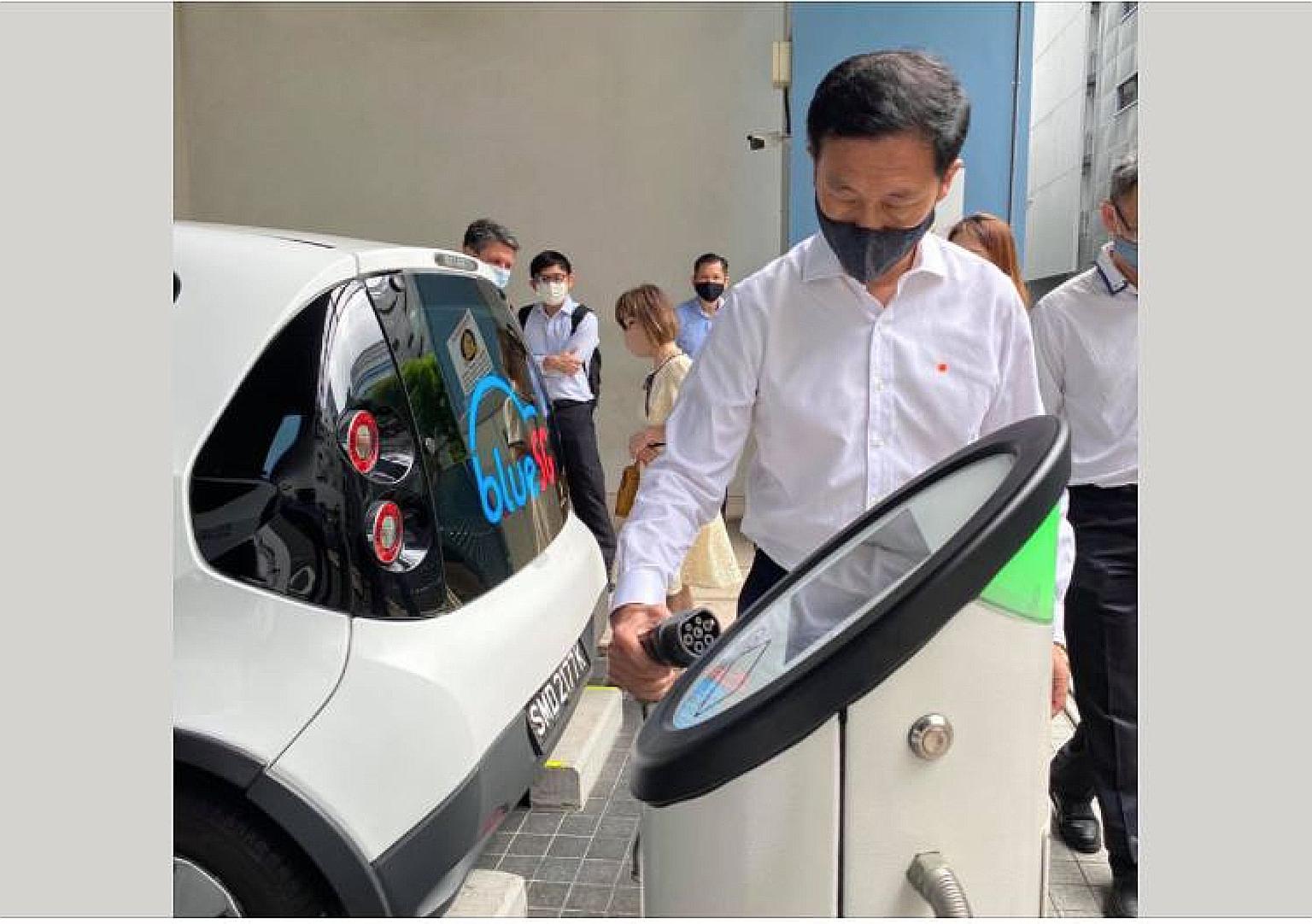Higher rebates, surcharges to cut vehicle emissions from next year
Sign up now: Get ST's newsletters delivered to your inbox

Transport Minister Ong Ye Kung beside a BlueSG electric vehicle (EV). He said the authorities are reviewing the plan to increase the number of EV-charging points to see if commercial parties could be roped in.
PHOTO: ONG YE KUNG/FACEBOOK
Rebates on the purchase of cleaner cars will be increased by $5,000 from Jan 1 next year to Dec 31, 2022, under the Vehicular Emissions Scheme (VES).
Cleaner taxis will have their rebates increased by $7,500 in the same time period, under the programme aimed at nudging motorists towards more environmentally friendly models of private transport.
In the carrot-and-stick model, surcharges for more pollutive vehicles will also be increased - by $5,000 for cars and $7,500 for taxis.
This will kick in on July 1 next year instead of at the start of the year to allow time for the market to adjust, and will be in effect until Dec 31, 2022, the National Environment Agency (NEA) and Land Transport Authority (LTA) said in a joint statement yesterday.
The increased rebates and surcharges mean buyers of cleaner cars will be awarded with rebates of up to $25,000, up from the previous $20,000, while buyers of the most pollutive cars will be penalised by $25,000, also up from $20,000.
The VES was introduced in 2018 to reduce carbon emissions on Singapore's roads. It categorises vehicles based on emissions across five pollutants, with each category's rebate or surcharge calibrated accordingly.
NEA and LTA said the scheme has been effective in encouraging the purchase of cleaner car models, with the number of new cars that qualify for the cleanest two bands increasing by 60 per cent between the third quarter of 2018 and the first quarter of this year.
The number of those in the most pollutive two bands has fallen by around 20 per cent in the same time period.
Singapore University of Social Sciences associate professor of economics Walter Theseira said the VES rebates and surcharges could push motorists towards the adoption of cleaner cars in two ways.
As motor car dealers usually quote a price inclusive of all taxes and certificate of entitlement bidding, a portion of the discounts usually goes to car buyers, while another could go to the dealers.
This means that in addition to consumers getting a discount, the VES changes could also encourage car dealers to import cleaner models.
Cleaner cars include the Hyundai Kona Electric, Renault Zoe and Toyota Prius Plus, while more pollutive cars are those like the Mitsubishi Outlander 2.0 CVT, Mazda CX-5 2.5 AT and Porsche Cayenne E3.
The enhanced VES is also a boon for aspiring electric car buyers, whose car models often fall under the cleanest bands.
Together with the early adoption incentive scheme for electric vehicle buyers announced by LTA in February - which offers rebates capped at $20,000 per vehicle - the increased rebates under the VES will allow for savings of up to $45,000 for each new fully electric car.
However, Associate Professor Theseira noted that there are additional factors to consider with regard to electric vehicles.
"The number of electric vehicle models is still very limited compared with that of internal combustion engines. Electric vehicles also require the owner to have available charging. I think until these two are solved, the VES change will have minimal effect," he said.
Transport Minister Ong Ye Kung said yesterday that industry watchers believe that costs for motorists choosing between electric vehicles and internal combustion engine vehicles will equalise by around 2025, or earlier.
Electric models are now still generally more expensive, and there were only 1,125 electric cars on the road as at January.
Mr Ong referred to Singapore's electric vehicle-charging infrastructure, which has been cited as a potential bottleneck by industry watchers who believe the lack of chargers could stop Singapore's electric dreams in its tracks.
Singapore currently has 1,800 charging points and is planning to increase this to 28,000 by 2030.
Mr Ong repeated what he said in Parliament last month - that the authorities are reviewing this plan to see if it could be made more ambitious by roping in commercial parties.
"What is clear is that EVs (electric vehicles) will become a reality, but we need to embrace and promote it," he said.


